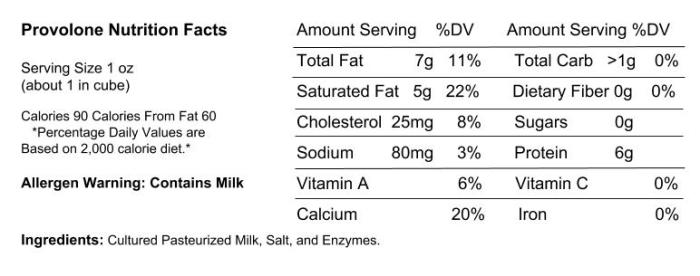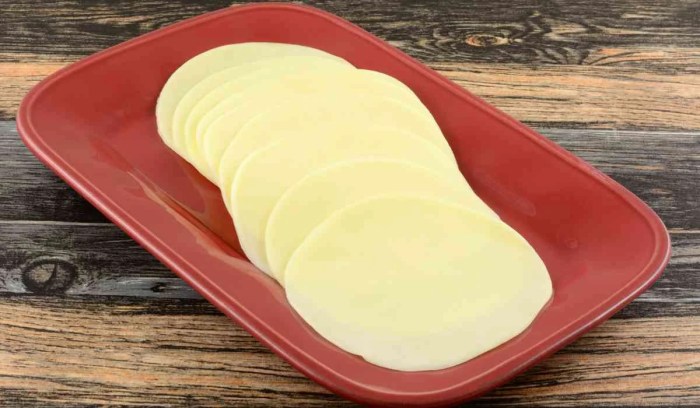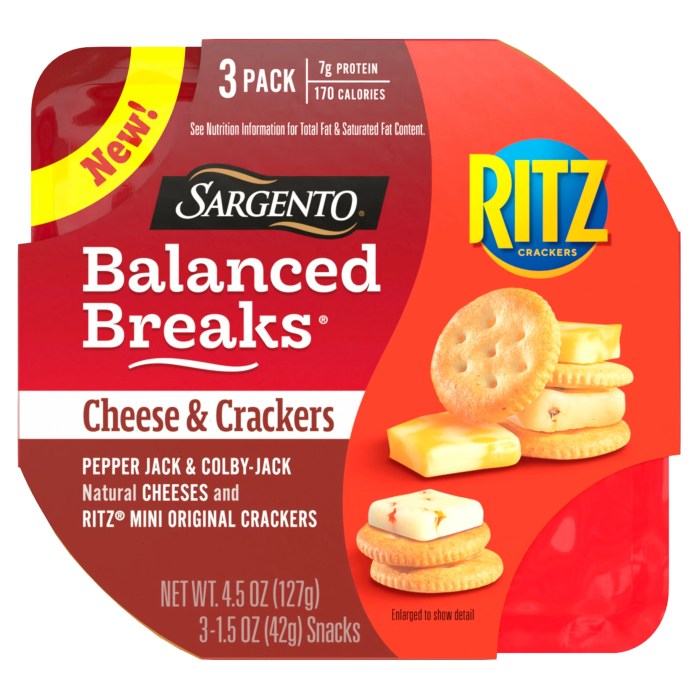Nutritional Composition of Provolone Cheese

Nutrition in provolone cheese – Provolone cheese, a semi-hard Italian cheese, offers a diverse nutritional profile varying slightly depending on its age and processing. Understanding its macronutrient and micronutrient composition is crucial for informed dietary choices. This section details the nutritional breakdown of provolone cheese, comparing it to other popular cheese varieties.
Macronutrient Composition of Provolone Cheese
Provolone cheese is a good source of protein and fat, with minimal carbohydrates. The exact amounts vary based on the type of provolone – aged provolone generally contains less moisture and thus a higher concentration of nutrients per unit weight compared to its younger counterparts. Smoked provolone may have slightly altered fat profiles due to the smoking process.
Generally, a one-ounce serving of provolone cheese provides approximately 7-8 grams of protein, 8-9 grams of fat, and less than 1 gram of carbohydrates. The high protein content makes it a valuable addition to a balanced diet, contributing to muscle building and repair. The fat content is largely composed of saturated fats, which should be consumed in moderation as part of a healthy eating plan.
Provolone, with its sharp tang, offers a unique nutritional profile, varying based on its age and fat content. A comparison might reveal interesting contrasts; for instance, consider the stark differences when juxtaposing it against the processed nature of one ounce velveeta cheese nutrition label , which highlights the sodium and saturated fat often found in processed cheeses.
Returning to provolone, its calcium and protein content remain key nutritional highlights, though careful consideration of the fat content is advised.
Micronutrient Content of Provolone Cheese, Nutrition in provolone cheese
Provolone cheese is also a source of several essential vitamins and minerals. The following table provides a detailed breakdown of the micronutrient content per serving, keeping in mind that values can vary slightly based on the cheese’s age and production methods. Note that bioavailability – the rate at which the body can absorb and utilize a nutrient – can be influenced by various factors including processing and the presence of other nutrients in the food.
| Nutrient | Amount per serving (grams/mg) | % Daily Value | Notes |
|---|---|---|---|
| Calcium | 200 mg | 20% | Essential for bone health; bioavailability can be affected by other dietary factors. |
| Phosphorus | 180 mg | 18% | Important for bone health and energy production. |
| Vitamin A | 100 IU | 2% | Supports vision and immune function. |
| Vitamin B12 | 0.5 mcg | 20% | Crucial for nerve function and red blood cell formation. |
| Riboflavin (B2) | 0.2 mg | 10% | Contributes to energy metabolism. |
| Zinc | 1 mg | 10% | Important for immune function and wound healing. |
Nutritional Comparison of Provolone with Other Cheeses
Comparing provolone’s nutritional profile to other cheeses provides context for its place in a balanced diet. The following table highlights the differences in protein, fat, and calcium content among several popular cheese types. Remember that these are approximate values and can vary depending on the specific brand and aging process.
| Cheese Type | Protein (g/oz) | Fat (g/oz) | Calcium (mg/oz) |
|---|---|---|---|
| Provolone | 7-8 | 8-9 | 200 |
| Cheddar | 7 | 9 | 200 |
| Mozzarella | 6 | 8 | 180 |
| Parmesan | 10 | 11 | 300 |
Health Implications of Provolone Cheese Consumption: Nutrition In Provolone Cheese

Provolone cheese, like other cheeses, offers a range of nutritional benefits and potential drawbacks depending on consumption patterns and individual health factors. Understanding both the positive and negative aspects is crucial for making informed dietary choices.
Bone Health Benefits of Provolone Cheese
Provolone cheese is a good source of calcium, a vital mineral for maintaining strong bones and preventing conditions like osteoporosis. Calcium is essential for bone growth, development, and overall bone density. The calcium in provolone cheese contributes to the daily recommended intake, supporting skeletal health throughout life, particularly during periods of growth and aging. Adequate calcium intake is particularly important for women during and after menopause, when bone loss accelerates.
Muscle Growth and Protein Content in Provolone Cheese
Provolone cheese contains protein, a macronutrient crucial for muscle growth and repair. Protein is composed of amino acids, the building blocks of muscle tissue. Consuming sufficient protein supports muscle maintenance and growth, especially important for individuals engaged in regular physical activity or strength training. The protein in provolone cheese, while not the sole source, complements other protein sources in a balanced diet to achieve optimal muscle health.
Overall Nutritional Contribution of Provolone Cheese
Provolone cheese offers a variety of nutrients beyond calcium and protein. It provides small amounts of vitamins, such as vitamin A and vitamin B12, and minerals like zinc and phosphorus, which play roles in various bodily functions. However, it’s important to note that provolone cheese should be considered part of a diverse diet rather than a primary source of these micronutrients.
A balanced intake of fruits, vegetables, and whole grains is necessary to ensure complete nutritional coverage.
Negative Health Effects of Provolone Cheese Consumption
While offering nutritional benefits, provolone cheese also contains saturated fat and sodium. High saturated fat intake is linked to increased levels of LDL cholesterol (“bad” cholesterol), potentially increasing the risk of heart disease. High sodium consumption contributes to high blood pressure, a major risk factor for cardiovascular diseases. Individuals with pre-existing conditions or those at high risk for heart disease or hypertension should monitor their provolone cheese intake and consider lower-fat or reduced-sodium varieties.
Lactose Intolerance and Provolone Cheese
Provolone cheese contains lactose, a sugar found in milk. Individuals with lactose intolerance may experience digestive discomfort such as bloating, gas, and diarrhea after consuming dairy products, including provolone cheese. The severity of symptoms varies depending on the individual’s level of lactose intolerance. Aged cheeses like provolone generally contain less lactose than fresh cheeses, but some individuals may still experience symptoms.
Lactose-free alternatives or smaller portions may be necessary for those with lactose intolerance.
Incorporating Provolone Cheese into a Balanced Diet
To enjoy the benefits of provolone cheese while mitigating potential risks, mindful consumption is key. Portion control is crucial. Instead of using large amounts of provolone cheese in sandwiches or as a snack, consider smaller portions as part of a larger meal that includes plenty of fruits, vegetables, and whole grains. For example, a few slices of provolone cheese on a whole-wheat sandwich with lettuce, tomato, and lean protein offer a balanced meal.
Another example could be incorporating small cubes of provolone into a salad with various vegetables and a light vinaigrette. Choosing lower-fat or reduced-sodium options can also reduce the saturated fat and sodium intake.
Answers to Common Questions
What are the best ways to incorporate provolone cheese into a low-fat diet?
Use provolone cheese sparingly, opting for lower-fat varieties when available. Incorporate it into salads in small quantities or as a thin topping on lean protein sources. Prioritize portion control.
Is provolone cheese suitable for individuals with high blood pressure?
Due to its sodium content, individuals with high blood pressure should consume provolone cheese in moderation. Choosing lower-sodium varieties or reducing overall sodium intake is recommended.
How does the aging process affect the nutritional content of provolone cheese?
Aging typically results in a higher concentration of certain vitamins and a reduction in lactose content, but also potentially increases the concentration of saturated fat.
Can provolone cheese be part of a vegan diet?
No, provolone cheese is a dairy product and is not suitable for a vegan diet.


